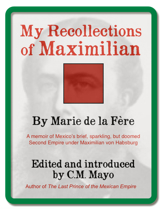|
My
Recollections of Maximilian
An eyewitness
memoir of Mexico's brief, sparkling but
doomed Second Empire under Maximilian von Habsburg
by
Marie de la Fère
A handwritten
manuscript circa 1910,
from the Bancroft Library,
University of California, Berkeley
Published
on-line and in print by permission of the Bancroft Library
Edited and Introduced
by C.M. Mayo
Author of
The Last Prince of the Mexican Empire,
the novel based on the true story
Dancing
Chiva
Introduction ©
C.M. Mayo 2012, all rights reserved.
http://www.cmmayo.com
ISBN
13: 978-0-9852781-5-1
ISBN 10: 0985278153
Cover
design by C.M. Mayo,
incorporating Opera Lyrics Smooth font by maltedmedia
|
 |
It
was the distinguished historian of Mexico, Robert
Ryal Miller, who told me about this
circa 1910 English language handwritten manuscript long-languishing
in the Bancroft Library at the University of California, Berkeley.
Very generously, as was his way, he wrote to me, knowing that
I was doing archival research for my novel, The Last Prince
of the Mexican Empire,
and recommended that I look it up on my next visit to the Bancroft.
There is always something magical about touching old paper, running
one's finger along the faded ink, but it turned out that I had
to read "My Recollections of Maximilian" on microfiche-
reeling a tape through a cranky old machine in a dark room. The
handwriting appeared to be that of an older person, elegant but
cramped, smallish, and set down in a first draft, as if jotted
one afternoon on whatever paper might have been handy, and only
after being repeatedly pressed by some younger friend. In places,
here a word, there a sentence fragment, were impossible to make
out. But reading it was well worth the trouble, for, among so
many other things, it gave me insight into the Mexican monarchists'
passionate feelings for their unlikely emperor, Maximilian
von Habsburg.
Younger brother of Austria's Kaiser Franz Josef, Maximilian was
shanghaied by pie-in-the-sky promises into serving as the puppet
emperor of Louis Napoleon's so-called Mexican Expedition. For
Mexicans, this Austrian with the beautiful uniforms and splendid
red beard who ended his young life in 1867 before a firing squad
in Querétaro, shouting, "Viva México!"
is a figure of endless fascination, ridicule, scholarly reconsidersations,
gossip, paintings, operas, musicals, movies, and, of course,
novels. Adding to the beguilement, his wife, the arrogantly beautiful
Carlota—granddaughter of France's King Louis Philippe (the
one who abdicated in 1848), daughter of King Leopold of Belgium,
sister of Leopold II (of Congo fame), and first cousin to Queen
Victoria— went raving mad in the Vatican and spent the rest
of her long life—she died in 1927— sequestered in a
castle in Belgium.
My novel is not about Maximilian and Carlota per se, but their
decision to bring the grandsons of Mexico's Emperor Iturbide—
a Mexican George Washington, monarchist version, who ended up
before a firing squad in 1824— into their royal household.
This was a decision frought with consequence, for the mother
of the younger child was Alice Green de Iturbide, an American
from an old and well-connected Washingtonian family. Though young
and naïve, in her attempt toget her child back, "Doña
Alicia" proved a formidable opponent to Maximilian, raising
a scandal from her forced exile in Washington to London and Paris,
where the U.S. ambassador, John Bigelow, was working assiduously
to convince Louis Napoleon to abandon Mexico.
Though Carlota negotiated the terms with the Iturbidefamily,
she did not sign the contract celebrated at Chapultepec Castle
in 1865. Often misunderstood as an"adoption," the arangement
was for Maximilian to take custody of the two Iturbide grandsons,
sending the older one to school in France and bringing the younger,
a toddler, who would have been in line for the throne of Mexico
had that earlier monarchy survived , into his Court, with a spinster
aunt, Josefa de Iturbide, serving as "co-tutoress."
Maximilian and Carlota had remained childless for the several
years of their marriage; for a monarchy, the lack of an heir
is a profound threat to the stability of the State. It has since
to come to light that Maximilian was trying to convince his family
to send a nephew as heir; in the meantime, the two-and-a-half-year-old
Agustín de Iturbide y Green would serve-and, so Maximilian
and Carlota calculated, co-opt any possible Mexican nationalist
monarchist movement that might coalesce around the heirs of Iturbide.
Mexicans of the 20th and 21st centuries know of Maximilian from
their television documentaries, movies, books, and most of all,
State-approved school texts, which, of course, celebrate the
Republican victory over the foreign invaders. Maximilian is treated
as a ridiculous figure, a nose-in-the-air aristocrat, duped by
Louis Napoleon or, less commonly, as romantically tragic—
too kind, too noble, etc. My own impression, after seven years
of reading and research, is that, though he made a grave miscalculation
in accepting the Mexican throne, Maximilian was far more politically
astute than is generally appreciated and, though he could charm,
he was also capable of surprising thrusts of cruelty.
What took me time to comprehend—for I was born into the
late 20th century U.S., hardly a bastion of monarchist sentiment—
was the Mexican monarchists' point of view. And this was vital,
for, strange as it was to me, to create believable characters
for my novel, I would need to render that point of view with
both compassion and dignity. "Marie de la Fère"
does not appear in The Last Prince of the Mexican Empire,
but her spirit does, infusing my many characters based on real
people close to Maximilian such as José Luis Blasio, his
secretary; José Fernando Ramíez, his Minister of
Foreign Affairs; and the many conservative ladies who gather
at Doña Juliana de Pedraza's at-homes, among them, Princess
Josefa de Iturbide.
In his last letter to me, Robert Ryal Miller mentioned that he
was preparing an edited and annotated version of "My Recollections
of Maximilian.". Not long afterwards, in 2004, to the great
loss of all who care about Mexican history, he passed away. I
never saw his edits or notes, I am sad to say, for I understand
he had identified the author whose name was not—as I too,
immediately suspected, "Marie de la Fère."
After Miller's death, as I felt this memoir deserved more readers
than we intrepid few who have eyes for microfiches, so I wrote
to the Bancroft for permission to print it both on-line as a
print book. This was granted in 2006.
Would that I could offer a more detailed introduction, but this
extraordinary memoir has been languishing in my files long enough.
I have corrected some misspellings and punctuation, though in
some places, where it reveals the author's charming linguistic
mélange, I have left it intact. Where the handwriting
was indeciferable, I added brackets around a question mark. For
ease in reading on-line, my few notes appear in brackets rather
than as footnotes.
Aside from such minor blemishes, what you have here, dear reader,
is a true treasure of the Second Empire, left to us by an old
señora who felt moved to pick up a pen, look back, and
open her heart. |
 |
 |
| It
seems almost impossible that forty three years have passed since I was
a witness and participator in the events connected with Maximilian's
reign three brief years in Mexico. My father was a retired American
banker and while traveling in Mexico had met and married my mother,
who is of Spanish and French descent. When Maximilian landed
at Veracruz, I was but seventeen years old. I was old enough
to realize and know that Mexican affairs both political and financially
were in terrible straights. My father conversed very freely to
us in English regarding the status of affairs. His money he trusted
to no Mexican bank; everything we had was in New Orleans and
he lived on the income accruing from his investments there. When
Juárez left the city and we learned that the French troops
were steadily advancing in [?] first Orizaba, Puebla and were
almost in Mexico City, father wished us to all leave and embark
either for New Orleans or Europe, but my mother would not listen
to it. Monseñor Labastida, who was always a welcome visitor,
had thoroughly imbued her with his ideas of Mexico's coming greatness
as soon as the Church party got control of affairs and she was
determined to see it out. And again a letter from France notified
us that our relative, Mama's uncle, an officer, was coming with
the "Interventionists." |
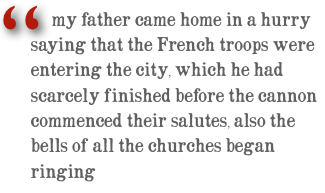 |
On
June 10th 1863 my father came home in a hurry saying that the
French troops were entering the city, which he had scarcely finished
before the cannon commenced their salutes, also the bells of
all the churches began ringing, the crowds in the streets were
[?] Triumphal arches with pictures of Napoleon and Eugenia wreathed
in flowers were in Plateros and San Francisco streets at the
Cathedral a Te Deum was chanted in honor of the entrance of General
Forey and Saligny with the French troops. In the evening a large
reception was given by the Ayuntamiento at the Nacional [sic]
Palace in honor of the French officers.
My uncle and Gen. B. [General Bazaine] and his aide [Captain
Charles Blanchot?] made our home their stopping place and they
certainly were a protection to us. Others of our friends had
petty officers quartered in their best rooms and everything in
the house was given over to them. My mother gave a large dinner
to General Forey, Saligny, and my uncle and many of their brother
officers enjoyed my mother's hospitality. At this dinner one
toast was significant, a certain priest first calling for a standing
toast to Emperor Napoleon said, "To the French Intervention
and their choice of a ruler for Mexico." I heard much the
next month about a convention of "notables" and that
they were forming plans for the future government of Mexico under
French protection.
On the 8th of July the bells again rang out a message to the
Mexicans. My father told us that they had met and voted that
Mexico should have an Emperor and that Napoleon had been asked
to select some Catholic prince in Europe willing to accept the
throne of Mexico. One of my mother's brothers was a member of
the Junta and by him I heard much of the affairs of Mexico.
In a letter to my mother dated Trieste, August 10th 1863, he
describes their reception in the Castle of Miramar. In it he
says, "Maximilian is 33 years old, tall, golden hair, straight
nose, blue eyes, golden beard, mustache much lighter, beard long,
and parted in the middle, he wore a blue frock coat, white vest,
black trousers and black tie. On his coat was the order of San
Esteban and he wore the golden collar of Toisón [Orden
del Toisón de Oro, Order of the Golden Fleece]. His manners
were affable, he stood calmly and serenely during the entire
presentation address of Señor Estrada, President of the
Delegation."
When the address was finished Maximilian told them that, "if
by popular vote of the Mexican people he was their chosen ruler
he would consider the petition." He remarked that, "French
Intervention," he hoped "would be the means of uplifting
the Mexican people." He then introduced the Deputation to
the archduchess Carlota whom he described as being, "Young,
lovely, handsomely groomed wearing superb collar of large diamonds
her manners he said were were gracious."
The Deputation were invited to dine with the archduke and his
wife that evening which they did everyone expressing themselves
as delighted with Napoleon's choice. I heard at the time that
the reason for Maximilian's demand for a vote of the Mexican
people was that some Mexican gentleman in an interview with the
Archduke had made the statement that Napoleon did not have a
right to appoint an Emperor to the Mexican throne and that the
masses of the people did not desire it. |
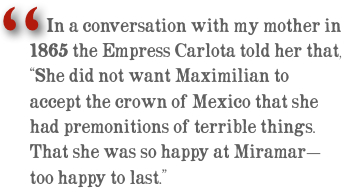 |
In
a conversation with my mother in 1865 the Empress Carlota told
her that, "She did not want Maximilian to accept the crown
of Mexico that she had premonitions of terrible things. That
she was so happy at Miramar— too happy
to last."
On April 10th 1864 Maximilian being advised that by the popular
vote he was the choice of the Mexican people signified his acceptance
of the crown of Mexico.
In another letter written from Paris in October '64 my uncle
said that Maximilian had received the blessing of the Pope and
that the courts of Europe were pleased with Maximilian as choice
as Emperor for Mexico.
My father was dubious and used to say to my mother, "These
Mexicans are laying up for themselves a terrible tragedy. Juárez
will never tamely submit to a monarchy." And when reading
of Lee's surrender at Appamattox he said, "As soon as things
begin to settle down at Washington you may look for trouble here."
And when Maximilian sent Señor Mariano Degollado as minister
to Washington and the government there refused to receive them
then my father looked wise indeed.
On May 28, 1865 the Themis with Maximilian and Carlota
and their escort the French [it was Austrian] gun boat Novara
were sighted by the French officers at Ulloa [Úlúa].
My mother had insisted that we all accompany my uncle to Veracruz
and a trip to Veracruz by carriage in those days was a most serious
undertaking bandits and cut throats infested every mile of the
way. But we had the protection of the French troops who were
to be a guard of honor to Maximilian and his suite to Mexico.
Veracruz in those days was much smaller than it is now—but on that day it really looked
beautifully [sic] every street had its flower covered arches.
Every balcony was decorated and everyone in gala attire. There
were thousands of Indians with their gaily colored blankets or
sarapes from the mountains. In every street was detailed French
troops. The ships in the harbor were gaily decorated with flags
and also all of the public buildings in Veracruz.
We were at the table when the guns at Ullua [sic] commenced.
The arrival of the expected Monarch we accompanied the French
officers to the wharf although their majesties did not come ashore
for more than two hours from the time they were first sighted. |
When they
landed they were presented by Maximilian's minister first to
the French officers and their wives and daughters, then to the
Committee from Mexico City and Veracruz. A speech of welcome
was addressed to them and then they were driven to the Palace
where an informal reception was held. It was my first glimpse
of Maximilian and Carlota and the glitter and gaity of the already-forming
court was a great attraction for a young girl and then the social
position of my parents made it possible for me to mingle as an
equal with the brightest in the land. Then commenced the triumphal
procession of their majesties to the Mexican capital.
The first night of their arrival was a grand Ball. I can remember
distinctly the splendor of the ladies' dresses, and costly ornaments.
The Empress had on a white silk trimmed elaborately with costly
lace and her diamonds were simply magnificent. My mother looked
so beautiful, dressed in shimmering folds of pink brocaded silk
and the rope of pearls she wore caused many to turn and gaze
on her rich Spanish beauty. As for me I was a young debutante
and wore a simple white dress with a wreathe of roses in my hair.
When Carlota spoke to me that evening I was so happy, she told
me, "I was dressed as befitted a young girl and that I looked
very sweet." Her dear smile and kind words made me her admirer
for the rest of my life.
The next day we left for Orizaba there was fully five hundred
troops guarding the Camina [sic] on which we traveled some rode
ahead some at the sides of the carriages and others behind— Every little Indian village
had its decorations and greetings. The Empress seemed so pleased
with everything and everyone returned a kind smile.
On reaching Orizaba there was a salute of cannon, the church
bells rang, bands played and banners and flags from every building.
The city officials gave the keys of the city to Maximilian with
a speech appropriate to the occasion. We all first went to the
Cathedral to celebrate High Mass from their [sic] to the city
Palace where for two days followed a series of banquets, receptions
and balls.
The people of Orizaba seemed to vie with each other in efforts
to make the royal visit one of pleasure and success. The Empress
appointed two ladies in Veracruz as Damas de Palacio [ladies
of honor] and in Puebla five and in Merida four, one in Campeche,
the others including my beloved mother were in Mexico City, 38
in all. She had but two Damas de Honor [a higher honor; and the
author is mistaken; these included the wife of General Almonte,
as she notes below] those were Sra Da Concepcion Plowes de Pacheco
and Srta Josefa Varela both of them I understand are now dead. |
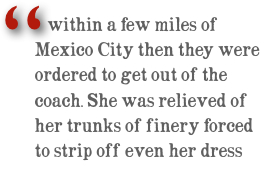 |
The
Empress's Grand Chamberlain was Sr Conde del Valle de Orizaba,
Viscount de San Miguel.
Speaking of the discomforts and dangers of travel in the sixties
when there were no railroads in the whole of Mexico. The Camino
Real or Kings highway was the only means of connection from Veracruz
to Mexico. Via Orizaba, Puebla and Mexico City this road still
attests the care used in building it wide, and paved with stone
all the way. Parts of it are in good condition yet. To illustrate
the dangers of a trip to Mexico City, my aunt who lived in Veracruz
married and wishes to bring her Paris finery to Mexico City to
be presented to Carlota. She and her husband started. She was
an industrious little woman she [be?guoled; began?] the trip
with a small basket of knitting. An old aunt of mine living here
had written to have her bring her a new bonnet of black braid
this she had done up neatly in paper and had in the coach with
her, they were not molested by robbers until within a few miles
of Mexico City then they were ordered to get out of the coach.
She was relieved of her trunks of finery forced to strip off
even her dress. They refused her aunt's bonnet permitting her
to keep it. Her husband got out at the Iturbide Hotel wrapped
in an old newspaper. My aunt was left her chemise, the black
bonnet and her basket of knitting. Their fellow passengers an
old priest, devoid of clothing, muttered continuous prayers of
malediction on the robbers. The mozo [manservant / porter] at
the Hotel always met the coach from Veracruz with blankets, for
everyone was invariably robbed in those days.
The trip from Orizaba to Puebla was marked by no untoward event,
stops were made at night along the route at the home of some
rich hacendado [plantation owner] then a fresh start in the morning.
The people of Puebla met the royal procession before we reached
Cholula. The Empress insisting on sending for mass to the sacred
chapel that crowns Cholula.
At Puebla a Te Deum was chanted in the cathedral and then
a reception at the Palace and a grand banquet and ball at night.
Two days more were spent there then began the last part of the
trip to Mexico City. On this trip I first met my husband who
was a colonel in the French army and who fortunately for me was
my equal in point of birth everyway. How glad we were on the
morning of June 12th 1865 to see the chapel of Guadalupe in the
distance. My mother and I were worn out by the long series of
social dissipations and wearisome carriage ride. Some three hundred
miles. Her Majesty seemed to be fresh and unwearied making no
complaints of the tedious trip, swe was wonderful.
A Te Deum was chanted in the cathedral at Guadalupe. The
Empress drank some of the water at the sacred well, and Maximilian
also. They were both always sincere and devout in their attentions
to all of the church services.
General Almonte who accompanied the Royal Couple from Veracruz
to Mexico City was the leading spirit in everything, he had charge
of the troops, formerly President of Mexico, he was a notable
figure in the history of Maximilian's reign. Maximilian appointed
him Minister of his Palace. When in full uniform, he wore the
following orders: |
Gran Cross
Imperial Order of Aguila of Mexico
" " of Guadalupe
" " The Legion of Honor of France
" " Iron Crown of Austria
|
| |
|
He
was also member of numerous Historical and Geographical Societies
of Europe and the United States. His wife, a most beautiful woman,
was the chief Dama de Palacio [lady in waiting] to Carlota.
At Guadalupe thousands of people came to meet their majesties,
the streets of the city were lined with people anxious to catch
a glimpse of their majesties. Every street had arches covered
with masses if beautiful flowers balconies were decorated with
lace flowers and banners. Cannon boomed from the cuartels. Church
bells rang a glad welcome, bands played [in the?] park. It was
a most beautiful sight and never since has Mexico ever seen such
a profusion of elaborate decorations. No one since Maximilian
has ever received one tenth of the homage that he did, on that
memorable, never to be taken again, trip to Mexico City.
They really did not enter the city until the 14th is my remembrance.
Much time was consumed in the sacred villa of Guadalupe. The
first stop in the city was the Cathedral which was a blaze of
candles and the floral decorations were superb. A Gran Te
Deum was chanted, Archbishop of Mexico Monseñor Labastida
presiding.
From there they passed under the beautiful arch at the head of
Plateros to the Castle of Chapultepec. Of this arch at the head
of Plateros much should be said. I can only remember with distinctness
that it was artistic and beautiful, at the top was alegorical
[sic] figures and underneath a frieze portraying the presentation
of the Crown to Maximilian by the deputation of Notables on the
right side was a fine statue of Maximilian on the left, of Justice. |
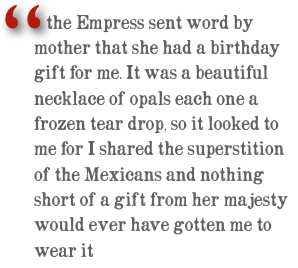 |
The
Junta of Notables had inaugurated a series of Receptions, Banquets
and Balls which followed for some two weeks after the arrival
of Maximilian. My birthday occurred soon after the arrival of
their majesties and on that day the Empress sent word by mother
that she had a birthday gift for me. It was a beautiful necklace
of opals each one a frozen tear drop, so it looked to me for
I shared the superstition of the Mexicans and nothing short of
a gift from her majesty would ever have gotten me to wear it.
Thanking her majesty I hurried from the Palace as quickly as
the formal etiquette of the court would permit and never have
I worn it since. I was afraid going home that something fearful
might overtake me. It remains in my jewel box and always will,
so long as I live, beautiful 'tis true, but carrying with it
to the wearer, ill luck in love, and all the affairs of life.
At one of those brilliant functions which inaugurated the reign
of Maximilian and Carlota I met the beautiful Princess Salm Salm.
She was admired by everyone her manners were perfect. She was
a blonde of more than medium height, slender, she had small tapering
hands, and dainty feet, blue eyes like violets bathed in dew
a laughing red mouth which ever opened to show a dazzling row
of teeth. She received many attentions from Maximilian and the
French officers, Carlota greeted her very kindly.
Another figure prominent in Carlota's court was the Princess
Josefa Iturbide [and] a most charming American, formerly a Miss
Green, I think [Alice Green de Iturbide, wife of Angel de Iturbide].
It was her son Agustín whom Maximilian adopted and made
his legal heir.
In September we were all in a flutter at the arrival of their
majestys [sic] grand coach of state, it was upholstered in white
brocaded silk & gold fringe. On the panels of the doors was
the Royal coat of arms the mountings were all of gold the Drivers
seat upholstered in crimson velvet with gold fringe there were
four cherubs in gold on the outside front & back. With the
liveried coachmen and lackeys it was a truly royal sight drawn
always by four beautiful white horses and followed by the French
soldiers in their dazzling uniforms it was everything that we
in Mexico will never see again. This coach, also his day coach,
are in the National Museum there is a large collection of Maximilian
relics donated by the widow of one of Maximilian's chamberlains,
Señora Doña Isabel Pesado viuda de [widow of] Mier
y Celis.
Scarcely had the court been fully organized and Maximilian vested
with the reins of government than news came from all sides that
Juarez who had been driven by the French troops across the border
was again fighting his way to the city. My father was much alarmed
at this state of affairs. That Maximilian did not fully understand
Mexican political affairs was well known to everyone I heard
great men of affairs say this, to my father again, and again,
when Matamoros was stormed and taken by the French, it was esteemed
an attack of Guerillas, nothing more.
We were alarmed greatly when my mother related how Marshall Bazaine
had been all one morning closeted with the Emperor and Empress,
and that Carlota had rung her bell violently, and when some of
her ladies rushed to her apartments she was in a fainting condition.
Father Fischer and Señor Don Federico Semeleder the Emperor's
physician were summoned. My mother was seriously alarmed. We
learned the next day that Marshall Bazaine had notified Maximilian
of Napoleon's order to withdraw the French troops. |
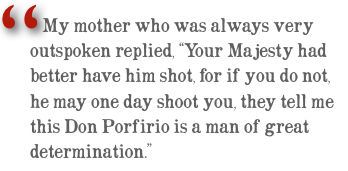 |
My
father had also received a letter saying that Gen. Grant was
massing an army of 200,000 men on the Rio Grande. That same week
Carlota announced to her ladies-in-waiting her purpose to go
to Europe. Consternation was everywhere felt. Shocking things
occurred daily. Robberies were nightly occurrences. Prices of
food and clothing were going up every day. Before Carlota's departure
my father and mother were invited to breakfast at the Palace,
during the breakfast an officer asked to present a telegram to
his majesty. On reading it, Maximilian turned to my father and
said, "They have captured Capt. Porfirio Diaz a guerilla
leader and ask what to do with him, he will not give a parole
and I do not want to shoot him" & turning in his vivacious
manner to mama he said, "Madame what shall I do with this
rebel." My mother who was always very outspoken, replied,
"Your Majesty had better have him shot, for if you do not,
he may one day shoot you, they tell me this Don Porfirio is a
man of great determination." His Majesty laughed, dismissing
the officer saying, "He would think it over."
My aunt accompanied Carlota to Veracruz, she seemed very sad,
all of her joyous lightness of disposition had left her, during
the night at Puebla she slept very little and my aunt who occupied
the adjoining apartment heard her repeatedly get up walking and
moaning. She remained sad during the entire trip to Veracruz
although never out of humor or never in any way showing unkindness
to the ladies and gentlemen accompanying her. She sailed on the
13th of the month and my aunt says that she refrained from calling
Carlota's attention to the date, but it filled my aunt's heart
with dread aforebodings [sic]. Maj. Robt. Gorsage, an American
of high standing at court accompanied Carlota to the ship showing
her many gentle attentions which were received by Carlota most
graciously. Maj Gosage said to me then, "Madame I never
expect to see her majesty again." My aunt exclaimed in horror.
"What, do you mean Major! Do you not think her majesty's
trip will have a successful ending & safe return?" Maj
Gorsage replied, "Madame, the monarchy cannot survive the
withdrawal of the French troops." |
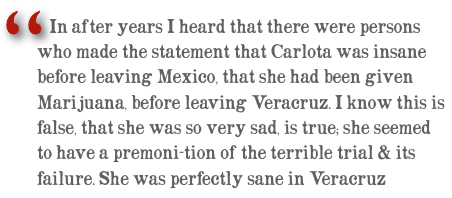 |
In
after years I heard that there were persons who made the statement
that Carlota was insane before leaving Mexico, that she had been
given Marijuana, before leaving Veracruz. I know this is false,
that she was so very sad, is true; she seemed to have a premonition
of the terrible trial & its failure. She was perfectly sane
in Veracruz. She conversed freely and sanely with my aunt and
the other ladies accompanying her. She received the social attentions
of the people of Veracruz in her usual dignified but generous
manner.
After her departure for Europe, society was very dull. In the
city there seemed to be apprehension of disaster on all sides.
My father tried to urge my mother to make a visit to relatives
in the U.S. but mother loved Mexico and did not care to make
visits away from home. So we stayed on and witnessed the closing
events of that brief, sad reign of Maximilian.
After Charlotte's [Carlota's] departure, social functions at
court were at a standstill, the guerillas under Escobedo from
the north and Porfio Diaz were steadily advancing. Maximilian
seemed to be stupefied. The Emperor, so the gossips said, began
a series of intrigues. I heard my aunt and other ladies of the
court talking about it. Juan Mateos in his "Cerros de las
Campanas" speaks of Pablo Fernandez's sister as being one
of his victims. I do know that every few weeks he with one or
two gentlemen and a body of troops went to Cuernavaca. My mother
simply said, "He goes to a lower altitude for rest."
I heard many names well known to me connected with Maximilian.
We were stricken with horror when it was announced that Carlota
while talking to His Holiness the Pope had fallen senseless at
his feet and had lost her reason.
Maximilian prepared to join the army. Then followed the fall
of Puebla after a desperate resistance by the French Mexican
troops. The marching out of the city of the French troops deserting
Maximilian we all felt that it was shameful. I can remember watching
the troops passing down Plateros— no arches— no flowers, it was like a
funeral procession, not a salute was given, they passed in silence
that was ominous. Their arrival and departure were scenes so
dissimilar that one could scarcely realize that it was the same
troops. My father said that in the rougher part of town they
were hissed and passed out of sight amidst hoots, yells, and
many ugly epithets. |
 |
Maximilian
left the city to the guardianship of Señor O'Horan. Diaz
was advancing toward the city, Escobedo advancing towards Querétaro,
Maximilian en route to Querétaro. General Lopez commanded
Maximilian's troops and it is he who sold them accepting a bribe
of some thousands of dollars which was never paid. Maximilian
was on horseback in the act of leaving Querétaro when
General Escobedo intercepted him and Maximilian surrendered.
We received the news two days later. It filled the hearts of
everyone with horror. Food was so scarce that everyone, rich
and poor suffered. My father had laid in stores of corn and carbon
months before, our friends begged for help, which had to be refused,
it was very trying.
Porfirio Diaz entered the city and Marquez tried to make terms
and failed. Many of our friends were arrested and all of the
adherents of the crown were under arrest. Many were shot, many
exiled. My father, an American citizen was unmolested and we
sailed from Veracruz to New Orleans one week after the arrest
of Maximilian at Querétaro. From dear friends we received
the last news of Maximilian. Of the large sums of money offered
by those faithful to him for his release, and permission to depart
in peace for Europe. The Princess Salm Salm went on her knees
to Juárez begging for his life. He replied ,"If Jesus
Christ would ask for his life he would refuse it."
His farce of a trial lasted but a few hours. Maximilian with
his two faithful Generals Miramón & Mejía were
condemned to be shot at daylight July 19th 1867. An example was
needed by Juárez and he chose the highest to wreak out
a vengeance which was unmerited by Maximilian, the dupe of an
intriguing party.
Three large stone pillars mark the place of execution. The Austrian
colony afterwards built a handsome chapel on the site. The marble
pillars in front of the altar represent Maximilian and his two
generals. |
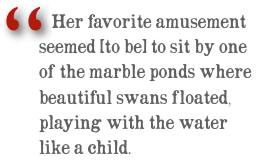 |
When
I was in New York City in 1878 I met Señora Clotilde Borch
de Cerda and her daughter the famous Esmeralda Cervantes, the
beautiful harpist. In a conversation with Señora Cerda
she told me of meeting and talking to Carlota at Trieste. Señora
Cerda was sketching the Castle of Miramar one morning outside
of the gates, for permission to enter was refused everyone. While
sketching, a lady and gentleman drove through the gates and as
she was quite close Carlota spoke to her asking of her sketch
which she seemed to like was for sale. Señora Cerda replied,
"That it was simply for her own pleasure." Carlota
asked her why she did not sketch inside of the park that the
view from the other side [of the] castle was more beautiful.
Señora Cerda replied that, "she had asked for permission
to sketch but that it had been refused." Carlota turned
quickly and asked "who gave those orders" the gentleman,
her physician replied. "You, your majesty." Señora
Cerda had not until then known to whom she was speaking, she
quickly saluted her majesty who smiled at her evident embarrassment.
She said. "I will leave instructions that you be admitted
every day during your stay here señora." She then
drove towards Trieste.
Señora Cerda accepted the kind permission of Carlota and
sketched there for many days in which she often saw her majesty,
who always seemed to remember her, and greeted her kindly often
asking her to have tea or some light refreshment. Her favorite
amusement seemed [to be] to sit by one of the marble ponds where
beautiful swans floated, playing with the water like a child.
Her appearance was that of a sad, lonely woman her talk was somewhat
disconnected. She was still beautiful and seemed to care much
for her pretty toillettes, being always artistically dressed.
She was always attended by her physician or a lady attendant.
One day she came up to Señora Cerda holding in her hand
a beautiful gold pencil saying, "You are going back to Mexico
and I want you to have this pencil, it is very nice for drawing."
It was beautifully engraved, and had in end an emerald of large
size on one side — M —
One of her ladies in waiting, Señora Otilia
[also known as Cordelia] Degollado, is now in Europe. She went
to Belgium to pay Carlota a last visit. All are old now and soon
all of those connected with the short reign of Maximilian in
Mexico will have passed away. |
 |
|
